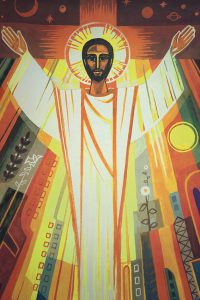April 2016
Holy Reflections
Fr James Lyons
Mary Magdalen’s intention in approaching the tomb after the Sabbath was to grieve the loss of Jesus. The energy and commitment she’d given to the cause of Jesus’ mission had drained from her. She came to weep among the dead. She had no expectation of finding life.
When Peter and the others heard her news that she’d seen Jesus alive they dismissed her story as nonsense. Everything they had lived for with Jesus had been taken from them with his death. They felt ashamed, having abandoned Jesus, denying their friendship.
This theme of loss and bewilderment threads its way through the Church’s celebration of the Easter season. Yes, the resurrection of Jesus is highlighted and rejoicing is evident, but our liturgies also acknowledge that it took time for the reality of Jesus’ death and the loss this entailed to give way to the conviction that he still lived.
Thomas refused to believe unless he saw and touched Jesus and his wounds. The heartbroken friends going home to Emmaus felt let down and were drained of hope.
Peter continued to struggle and considered going back to his fishing career. But even that failed to satisfy.
When something collapses in our lives it’s very hard to see a positive side. A redundancy, a sudden illness, the death of a loved one – anything bad or disagreeable, anything that strikes fear or breaks a heart – brings darkness and you feel very alone.
Refugees fleeing their homeland and the inability of other countries to cope with their need for shelter, safety and hope provide a graphic illustration of intolerable loss. The irresponsible use of resources that threatens the life of our common home, Earth, and the violence that brings terror to individuals and nations, also threaten to blind us to anything positive or from seeing the possibility of new life or a new direction.
When bad stuff hits you, life can seem pointless or at best very unfair. It’s like a desert has claimed you; your life is dry, barren, wasted.
But not even a desert is totally lifeless. Even a small amount of rain on a desert place will bring a sudden burst of plant life that has been lying dormant beneath the scorched earth. Life can survive the harshest conditions – even where appearances suggest otherwise.
Dr Robert Wicks, a medical psychologist, gives an example from his experience treating veterans from the Vietnam War. He said most people in the war zone found night a very fearful time. And fear prevented them from noticing the wonderful smells in the Vietnam night – the smell of mint, coriander, thyme and sage. He wrote, ‘simple statements like this serve as reminders to stay awake so we can know what gifts lie before us – especially in the most trying of times.’
Only in harmony with one another and with our world can life be managed. We cannot avoid the tough times, the darkness – we just need to appreciate they come with a purpose, to help life become even better!
Easter comes out of the dark of Good Friday. A life gifted in love, without resentment, without anger and totally forgiving, will live on far beyond death. These are the lives we remember and cherish. They are models for our own living. Your own dark times, the times you feel defeated, lost in a desert, enveloped by a toxic cloud, are not punishments; they do not signal you as a failure. They always carry seeds of new beginnings, new possibilities, new life.
Our Christian faith endorses this approach. Jesus is our way, our model. Our life with him begins with an empty tomb. And as we struggle with that emptiness and our own, there arises the one question to us from Jesus – the same one he asked Peter lost in his darkest hour: Do you love me? Answer YES and life is yours, forever. Answer YES and no loss will ever trouble you again.
